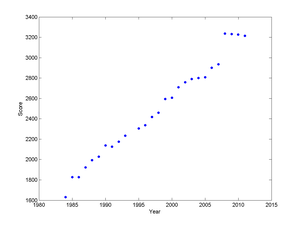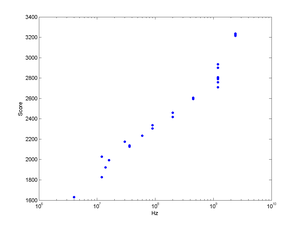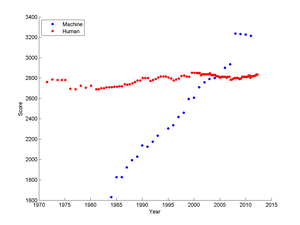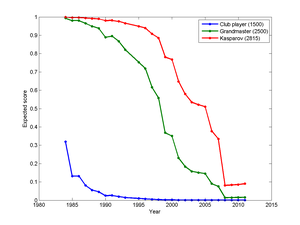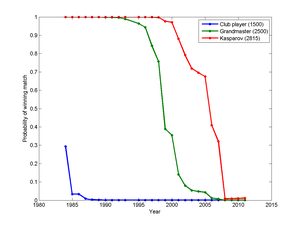March 21, 2012
Machine domination in graphs
When chess machines passed human performance, how fast did it happen?
Here is a plot of the Elo ratings of chess systems from the Swedish Chess Computer Association tournaments:
Of course, the data is noisy - I don't really think chess software has become worse over the last few years. In this case it might just have been a narrowing of the field.
Plotting them as a function of clock speed produces the following intriguing graph, showing some jumps in software performance on the same hardware:
Combining the first graph with List of FIDE chess world number ones - Wikipedia, the free encyclopedia we get the following relative graph:
It shows nicely how humans have not been getting much better, while the machines improve from nearly hopeless to superhuman.
Of course, this is slightly iffy: while SSDF has tried to calibrate against humans one can always question the commensurably.
One can also calculate the probability of winning against players of different ranks (again assuming commensurability):
Looking at 6 game matches the probability of winning the majority looks like this, a bit sharper:
Human amateurs were already having trouble at the start, but grandmasters could be confident at the start of the 90s... and were outclassed by the end.
Observant readers might wonder why Kasparov lost to Deep Blue in 1997. The reason is that this tournament data uses consumer machines, not the supercomputer IBM pitted against him. For 1997 the winner in the tournament was HIARCS 6.0, running on a 49 MB P200 MMX. Deep blue was a 30 node system with a 120 MHz processor per node, plus 480 special purpose chess chips. It ran at 11.38 GFLOPS on numerics. A pentium MMX at 200 MHz is around 23.53 MFLOPS. So Deep Blue was at least 484 times more powerful (and likely quite a bit more, thanks to the special chess chips and parallelism).
So the mystery of why it won so early is solved: the brute force allowed IBM to get extra performance equivalent to perhaps a decade development.
March 19, 2012
I welcome our new smaller climate optmized green cat-like overlords
 (title borrowed from Anthony Watts)
(title borrowed from Anthony Watts)
Some other reactions or comments to my "green dwarves" paper:
TheGuardian: Bioengineer humans to tackle climate change, say philosophers. Leo Hickman gave us a chance to respond to the criticisms, and printed them at length. This is your opportunity to see how we deal with them individually.
Slate: Is "Human Engineering and Climate Change" Paper a Case of Academic Trolling? - Slate thinks we may be trolling.
Io9: Four ways we could hack human bodies to save the environment - a science fiction site sceptical of the feasibility of our ideas? What next, criticism of the practicality of steampunk? :-)
Planet of the (Little) Apes | Practical Ethics - Steve thinks about the children. How fun would it be to grow up short if your parents are environmentally conscious?
Jeffrey Bossert Clark: Re-making Man by Choice and Decree has a bunch of criticisms at the Library of Law and Liberty (some which I entirely agree with).
The Bard of Murdock: Inventing Children A "poetical cartoon" based on the paper.
Small dead animals had a poll, finding that 98% of participants favoured "Grind Up climate alarmists into tiny particles and blast them into the lower troposphere" over our proposals. Don't they know that climate alarmists being green have a suboptimal reflection spectrum, and will not be efficiently lofted into the stratosphere before they rain out?
I expect that the story of the paper will be the usual one: in a few months it is a paper among other papers in an ethics journal, perhaps cited a few times if we are lucky (if only as a warning example of a stupid idea - but that still counts!). Meanwhile the paper will take on another life among the undergrowth of the noosphere, mutating into the story that scientists are working on (or have already done) re-engineering people to be green (probably using chemtrails or brain implants). It will be yet another piece of evidence of the Big Conspiracy. You doubt it? Look at all those blog posts, that paper was real!
What struck me the most was that the big outcry came from the climate-sceptics rather than the traditional greens (although having Bill McKibben tweet that the paper contained the "worst climate change solutions of all time" warms my heart). I guess this is because they tend to hold conservative views (psychologically if not ideologically) and hence the paper pressed the "messing with human nature" hot button besides the "something radical must be done about the climate" hot button. Among the greens and libertarians only one button was pushed.
I'll work on that for my next paper. Just how many hot buttons can I innocently press?
March 13, 2012
Is the future green dwarves?
 Seems that Slashdot has noticed the paper Human Engineering and Climate Change by Matthew Liao, me and Rebecca Roache. There is an interview with Matthew in The Atlantic
Seems that Slashdot has noticed the paper Human Engineering and Climate Change by Matthew Liao, me and Rebecca Roache. There is an interview with Matthew in The Atlantic
The fun part is that Slashdot tagged it 'troll'. Which I personally find accurate: when I contributed, I felt I was partially trolling.
The basic argument is that climate change and many other environmental problems have upstream and downstream solutions. For example, 1) human consumption leads to 2) a demand for production and energy, which leads to 3) industry, which leads to 4) greenhouse gas emissions, which lead to 5) planetary heating, which leads to 6) bad consequences. One solution might be to try to make less emissive industry (fix the 3-4 link). Another might be to remove greenhouse gases from the atmosphere (reduce 4), geoengineering that cools the planet (reduce 5) or adapt to a changed world (handle 6). The latter are downstream solutions.
When geoengineering is suggested many people think it is better to use an upstream solution for a variety of reasons (controllability, scepticism of technological fixes etc). Consuming less would be really upstream (ignoring the practical problems of actually doing it to the extent necessary, which are pretty major, and the countervailing aspects of human psychology). But if it is better to have upstream solutions, why not go for cause 0, human desires for various things? If people do not want meat, plenty of grassland could be reforested and emissions reduced. If people want to have fewer children, resources become less scarce and so on. If people are smaller, they need less resources.
So we argue that it might be a good idea to look at reengineering humans to be green. Obviously we can change ourselves through culture and rational convincing... to some extent. But it is tough to change lifestyle this way. So might there be tricks to modify ourselves in order to better behave in ways we want to want. Biological means to make our second order desires dominate first order desires.
The methods we mention are mostly examples and likely *far* too wussy to amount to much. But there might be better methods if we were to investigate them properly. Of course, in the long run I think the real sustainable choice is to become postbiological. But that is a bit further away. This is also why I doubt genetic engineering is going to be that effective: it takes so long time, parents will be very cautious about it, and the things that can be done ethically are fairly limited.
To some degree I think our paper is green design fiction of the kind I criticised earlier. But I suspect that the ethical irritant effect of bioengineering humans might be enough to trigger some thinking about to what lengths we actually do want to go about fixing the environment. Sometimes downstream solutions might be more ethical and humane. But we should not imagine that our biological nature is exempt from being part of a potential solution.
March 02, 2012
Censorship and surveillance: two sides of the same coin?
 The censor and the eavesdropper: the link between censorship and surveillance | Practical Ethics
The censor and the eavesdropper: the link between censorship and surveillance | Practical Ethics
My basic argument is that Doctorow's point that censorship is inseparable from surveillance likely goes both ways: surveillance systems tend to impose censorship.
